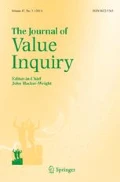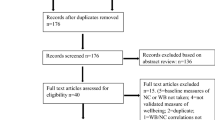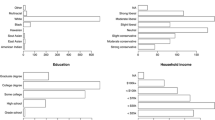Abstract
Epicurus’ theory of what is good for a person is hedonistic: only pleasure has intrinsic value. Critics object that Epicurus is committed to advocating sensualist excess, since hedonism seems both to imply that more pleasure is always of some good for you, and to recommend even debauched, sensual kinds of pleasure. However, Epicurus can respond to this objection much like J. S. Mill responds to the objection that hedonism is a “doctrine worthy only of swine”. I argue that Epicurus’ hedonism is a version of qualitative hedonism on which static pleasure is intrinsically superior to other kinds of pleasure. I also argue that Epicurus conceives of pleasure as a phenomenal or felt quality of experience, and that this is compatible with his troublesome claim that there is an upper limit to pleasure and wellbeing.
Similar content being viewed by others
Notes
See Brad Inwood and L. P. Gerson, The Epicurus Reader: Selected Writings and Testimonia (Hackett Publishing Company, 1994).
More precisely, obtaining more pleasure is beneficial except in those cases where doing so brings about additional pain whose disvalue outweighs the value of the additional pleasure. Epicurus emphasizes that he does not recommend pursuing additional pleasure in such cases (LM 129). But the worry can still be raised, that hedonists seem committed to advocating excess in claiming that more pleasure is always of some good for you.
These worries are reminiscent of Socrates’ criticism of Callicles in Plato’s Gorgias. Epicurus may have wished to contrast his views with those of Callicles, if he was familiar with Gorgias, but Epicurus is more certainly contrasting his views with those of the Cyrenaics.
See J. S. Mill, Utilitarianism, chp. 2 (first published in 1863).
For an introduction to philosophical debates about wellbeing, see Roger Crisp, “Well-Being” The Stanford Encyclopedia of Philosophy (Summer 2013 Edition), Edward N. Zalta (ed.), http://plato.stanford.edu/archives/sum2013/entries/well-being/.
See Diogenes Laertius, Lives of Eminent Philosophers, trans. R.D. Hicks, (Harvard University Press, Loeb Classical Library 1925), sec. 10.136. I wish to remain as neutral as I can about the nature of kinetic pleasure, as well as about how the static-kinetic relationship is to be explained. For detailed discussions of these issues, see J. C. B. Gosling and C. C. W. Taylor, The Greeks on Pleasure (Oxford University Press, 1982); A. A. Long and D. N. Sedley, The Hellenistic Philosophers vol 1 (Cambridge University Press, 1987); and David Wolfsdorf, Pleasure in Ancient Greek Philosophy (Cambridge University Press, 2012).
See Clement of Alexandria, Stromata, sec. 2.130. The Cyrenaics’ criticism is an obvious echo of Callicles’ objection to Socrates in Plato’s Gorgias.
See Raphael Woolf, “Pleasure and Desire” in James Warren (ed.) The Cambridge Companion to Epicureanism (Cambridge, 2009), p. 174.
Ibid, p. 174.
The ‘yardstick’ claim is confirmed by Cicero’s Epicurean spokesman who claims, “(Epicurus) denies that there is any need for justification or debate as to why pleasure should be sought, and pain shunned. He thinks that this truth is perceived by the senses, as fire is perceived to be hot, snow white, and honey sweet” (On Moral Ends, sec. 30). See Cicero On Moral Ends trans. Raphael Woolf and ed. Annas, Julia (Cambridge Texts in the History of Philosophy).
See Diogenes Laertius, op. cit., 10.64-66.
I treat the category referred to by ‘feeling’ broadly so as to include sensations, perceptions, and other phenomenal features of experience.
I follow Andrew Moore in distinguishing phenomenalist theories of pleasure from others like Feldman’s attitudinal theory of pleasure. See Andrew Moore, “Hedonism” The Stanford Encyclopedia of Philosophy (Winter 2013 Edition), Edward N. Zalta (ed.), URL = http://plato.stanford.edu/archives/win2013/entries/hedonism/, sec. 2.1.
See Fred Feldman, Pleasure and the Good Life (Oxford University Press, 2004), p. 56–9.
See Clay Splawn, “Updating Epicurus’ Concept of Katastematic Pleasure” Journal of Value Inquiry 36 (2002), 4, p. 474–7; and Feldman, op. cit., appendix C, esp. p. 96–8.
See Phillip Mitsis, Epicurus’ Ethical Theory: The Pleasures of Invulnerability (Cornell University Press, 1988), p. 19–39. I also criticize John Cooper on this point below in sec. 4.
For discussion of pluralist phenomenalist theories of pleasure, see Roger Crisp, Reasons and the Good (Oxford University Press, 2006), chp 4; and Moore 2013, op. cit. I develop such theories in Andrew Alwood, 2017a “How Pleasures Make Life Better”, Kriterion - Journal of Philosophy 2017, 31 (1): 1–24; and in Andrew Alwood, 2017b “The Value of Heterogeneous Pleasures”, Journal of Happiness Studies 2017, https://doi.org/10.1007/s10902-017-9924-4.
See Mill, op. cit., chp 2.
Ibid
See Jeremy Bentham, The Principles of Legislation and Morals (London: T.Payne and Son), (first published in 1789), chp 4. Although Bentham also mentions factors like “certainty” and “propinquity” alongside intensity and duration, he is standardly interpreted in the way I have stated.
The contemporary method of measuring pleasure by intensity and duration is articulated in Feldman 2004, op. cit., chp 2.
See Cicero, op. cit., sec. 38; and Plutarch Against Epicurean happiness 1089D in Long and Sedley 1987 (LS 21 N).
See Woolf 2009, op. cit., p. 173.
Is it possible for a swine to enjoy the special feeling that I claim Epicurus identifies with static pleasure? One might think it desirable to say yes, as David Konstan argues, since Epicureans emphasize the animality of humanity. Yet I think Epicurus could agree with Mill that the higher pleasures are unavailable to beings that lack higher faculties, and claim further that only humans can experience static pleasure. See David Konstan, “Epicurean Happiness: A Pig's Life?”, Journal of Ancient Philosophy 6 (2012), 1.
See Crisp 2013, op. cit., sec. 4.1. A true hedonist must endorse ‘explanatory hedonism’ on which what makes pleasure valuable is its pleasantness.
See Woolf 2009, op. cit., p. 176 and fn 35.
Ibid, p. 169. I have added italics to this quotation for emphasis.
See Terence Irwin, The Development of Ethics vol I (Oxford University Press, 2011), sec. 154, p. 272.
Ibid, p. 271.
See John Cooper, Pursuits of Wisdom (Princeton University Press, 2012), chp 5, p. 232–3, and also John Cooper, Reason and Emotion Princeton University Press, 1999) chp 22, p. 512.
See Diogenes Laertius, op. cit., 10.136.
For more discussion of the objection that Mill is not a true hedonist, see Roger Crisp, Mill on Utilitarianism (Routledge, 1997), chp. 2; and David Brink, “Mill's Moral and Political Philosophy” The Stanford Encyclopedia of Philosophy (Fall 2014 Edition), Edward N. Zalta (ed.), URL = http://plato.stanford.edu/archives/fall2014/entries/mill-moral-political/.
I defend a Millian doctrine of higher pleasures in the face of this criticism in Alwood 2017a, op. cit., sec. 4.
Critics of Epicureanism often cite Epicurus’ own words when they raise something like this worry of sensualism, for Epicurus praises sensory pleasures saying, “For my part I cannot conceive of anything as the good if I remove the pleasures perceived by means of taste and sex and listening to music, and the pleasant motions felt by the eyes through beautiful sights, or any of the pleasures which some sensation generates in a man as a whole” (Cicero, Tusculan Disputations 3.41–2; reprinted in Long and Sedley 1987, op. cit., 21L). For discussion of why Epicurus’ praise of sensory pleasure does not commit him to sensualism, see Gosling and Taylor 1982, op. cit., chp 19; and Long and Sedley 1987, op. cit., p. 123–4.
See Crisp 1997, op. cit., chp 2; and Crisp 2006, op. cit., chp 4. Crisp’s example is reminiscent of the discussion of pleasure in Plato’s Philebus.
Mill seems to posit such discontinuities between higher and lower pleasures in his description of the preferences of competent judges: “…what makes one pleasure more valuable than another, merely as a pleasure, except its being greater in amount… (is) a decided preference (of competent judges who)…would not resign it for any quantity of the other pleasure… .” See Mill, op. cit., chp 2; and Crisp 1997, op. cit., chp 2. The vocabulary of ‘discontinuity’ comes James Griffin, Well-Being: Its meaning, measurement and moral importance (Clarendon Paperbacks, 1986), chp. 5. (Thanks to an anonymous referee for pointing out that it was Griffin who introduced this term.)
I thus interpret LM 129 “every pleasure is a good thing” as either implicitly restricted to static pleasure, or else granting a pro tanto instrumental value to non-static pleasures which, in the case of profligate pleasures, is outweighed by their bad consequences, so that we ought to avoid them.
One might object that this view is no longer a version of hedonism at all, since it claims that certain pleasures have no value. I have some sympathy for this worry, and explore the objection in more detail in Alwood 2017a, b, op. cit. We have to distinguish the hedonistic claim that all pleasures have intrinsic value, from the hedonistic claim that only pleasures have such value. On my interpretation, Epicurus is a hedonist who posits intrinsic value only in one thing, the particular kind of pleasantness – static pleasure – experienced in a state free of pain and distress.
Epicurus appears to be denying the thesis defended by Protarchus in Plato’s Philebus, that pleasure is unlimited, and so further distinguishing his own version of hedonism from others being discussed in Ancient Greece around that time period.
Note that I have articulated LQP so as to focus on how much pleasure can be enjoyed at a time. Additional complexities arise for the related thesis that there is an upper limit to how much pleasure can be enjoyed over an extended period of time, such as over the course of an entire life. I mention some below.
See Epicurus’ Principal Doctrines 3 and 18 in Inwood and Gerson 1994, op. cit.
For example, see Principle Doctrine 19 where Epicurus appears to say that the duration of pleasure does not affect its value. This claim is apparently incompatible with any theory of pleasure mentioned in this paper. Every positive account of static pleasure, be it an attitude or a phenomenal feature of experience, includes duration as a factor in the value of pleasure. Moreover, even a negative characterization of static pleasure as simply the absence of pain and distress would seem to imply that it is better for one to lack pain and distress for longer periods of time than shorter ones.
Another interesting complication pertains to whether Epicurus means to reconcile hedonism with Plato’s thesis in Philebus that the good is limited. Epicurus might think that the rational limits on human wellbeing should cause us to be indifferent to the duration of pleasures and pains.
Author information
Authors and Affiliations
Corresponding author
Rights and permissions
About this article
Cite this article
Alwood, A. Epicurean Hedonism as Qualitative Hedonism. J Value Inquiry 52, 411–427 (2018). https://doi.org/10.1007/s10790-017-9623-8
Published:
Issue Date:
DOI: https://doi.org/10.1007/s10790-017-9623-8




